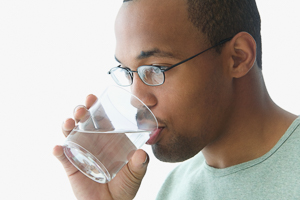Our Health Library information does not replace the advice of a doctor. Please be advised that this information is made available to assist our patients to learn more about their health. Our providers may not see and/or treat all topics found herein.
Topic Contents
Drinking Enough Water
Overview

Why is it important to drink enough water?
Water keeps every part of your body working properly. It helps your body flush wastes and stay at the right temperature. It can help prevent kidney stones and constipation.
You lose water throughout the day—through your breath, sweat, urine, and bowel movements. If you live in a hot climate, you lose even more fluid.
You need to replace this lost fluid to stay healthy. If you don't get enough water, you could become dehydrated. If you get very dehydrated, your body no longer has enough fluid to get blood to your organs. This is dangerous.
What is the right amount of water to drink each day?
A common recommendation is to drink six to eight 8-ounce glasses of water or other fluid every day. But some adults may need more or less. It depends on how healthy you are, how much you exercise, and how hot and dry the climate is.
Most healthy people get enough fluid through the beverages they normally drink each day. You also get water through food. Some fruits and vegetables contain a lot of water.
If you are a healthy person, here are some signs that you are drinking enough water:
- You urinate every few hours during the day.
- You feel well.
- You are not thirsty very often.
People with certain health problems, especially heart and kidney problems, need to talk with their doctor about how much water to drink.
Do you have to drink only water to stay hydrated?
All liquids help you stay hydrated. Water is usually the best choice, because it's free (if you're drinking tap water) and has no sugar or calories. But most healthy people can get enough fluid through the beverages they consume every day. These can include water, fruit juices, coffee, sodas, iced tea, and other drinks.
Experts say that it's not true that beverages that have caffeine—such as coffee, tea, and cola drinks—always dehydrate you. Healthy people who consume moderate amounts of caffeine don't lose more fluid than people who don't have any caffeine. A moderate amount of caffeine is about 200 to 300 milligrams a day. That's about two to four 8-ounce cups of coffee.
You also get water through food. Some fruits and vegetables contain a lot of water, such as watermelon and lettuce.
What are some easy ways to get more water during the day?
- Drink a glass of water when you get up in the morning, before you have coffee or tea.
- Keep a cup or water bottle by your desk at work. Take several sips of water each hour. If you don't have a desk job, carry a container of water with you, and take sips throughout the day.
- Take a sip whenever you pass a drinking fountain.
- If you get tired of drinking plain water, add sugarless flavoring to your water. Or put a slice of lemon or lime in plain or sparkling water.
Is bottled water better than tap water?
Bottled water is not better than tap water. A lot of plain bottled water is just tap water that has been purified. It's your choice how you want to drink water. If you like bubbly mineral water, drink that. If you like the idea of vitamins and electrolytes in your water, you can find several varieties of enhanced water at the store.
If you don't like the taste of your tap water or if you just want to be extra careful, you can purify tap water at home. Water filters are available in many stores.
Related Information
Credits
Current as of: October 7, 2024
Author: Ignite Healthwise, LLC Staff
Clinical Review Board
All Ignite Healthwise, LLC education is reviewed by a team that includes physicians, nurses, advanced practitioners, registered dieticians, and other healthcare professionals.
Current as of: October 7, 2024
Author: Ignite Healthwise, LLC Staff
Clinical Review Board
All Ignite Healthwise, LLC education is reviewed by a team that includes physicians, nurses, advanced practitioners, registered dieticians, and other healthcare professionals.
This information does not replace the advice of a doctor. Ignite Healthwise, LLC disclaims any warranty or liability for your use of this information. Your use of this information means that you agree to the Terms of Use and Privacy Policy. Learn how we develop our content.
To learn more about Ignite Healthwise, LLC, visit webmdignite.com.
© 2024-2025 Ignite Healthwise, LLC.




